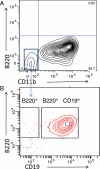Alcohol affects the late differentiation of progenitor B cells
- PMID: 21098503
- PMCID: PMC3002845
- DOI: 10.1093/alcalc/agq076
Alcohol affects the late differentiation of progenitor B cells
Abstract
Aims: Previous studies show that alcohol exposure can affect the differentiation of progenitor B cells. Before final commitment to a B lineage, progenitor B cells usually undergo several important stages. However, it is still unclear whether alcohol alters B cell differentiation at which stages. The aim of this study was to determine which stage(s) of progenitor cell differentiation are affected by alcohol and to elucidate the mechanism(s) responsible for the effect of alcohol on B cell differentiation.
Methods: Oligoclonal-neonatal-progenitor (ONP) cells from bone marrow cells of 2-week-old mice were cultured under different conditions in vitro with or without the exposure of 100 mM alcohol. Phenotype analysis was performed at different time points and expression levels of transcription factors (TFs) and cytokine receptors were measured quantitatively and kinetically.
Results: After 3 days in vitro culture, ONP cells differentiated into two populations: B220(-)CD11b(-) and B220(-)CD11b(+) cells. B220(-)CD11b(-) cells can further differentiate into B lineage cells only with the support of B220(-)CD11b(+) cells. Cells exposed to 100 mM of alcohol during the first 3 days of culture showed no statistically significant difference in B cell formation after 12 days compared with the control group. However, cells exposed to alcohol from Day 4 till the end of culture yield very few B cells. Expression levels of TFs and cytokine receptors were down-regulated kinetically among ONP cells co-cultured with the addition of 100 mM alcohol.
Conclusions: Alcohol affects the ONP cell differentiation into B lineage at a late stage. Alcohol also down-regulates the expression level of TFs and cytokine receptors resulting in the impairment of B cell differentiation.
Figures





References
-
- Adams B, Dorfler A, Aguzzi A, et al. Pax-5 encodes the transcription factor BSAP and is expressed in B lymphocytes, the developing CNS, and adult testis. Genes Dev. 1992;6:1589–607. doi:10.1101/gad.6.9.1589. - DOI - PubMed
-
- Baker RC, Jerrells TR. Recent developments in alcoholism: immunological aspects. Recent Dev Alcohol. 1993;11:249–71. - PubMed
-
- Biber KL, Moscatello KM, Dempsey DC, et al. Effects of in utero alcohol exposure on B-cell development in the murine fetal liver. Alcohol Clin Exp Res. 1998;22:1706–12. - PubMed
-
- Blot WJ. Alcohol and cancer. Cancer Res. 1992;52:2119s–23. - PubMed
Publication types
MeSH terms
Substances
Grants and funding
LinkOut - more resources
Full Text Sources
Research Materials

